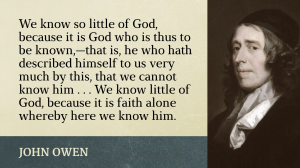“We do not have a strong church today, nor do we have many strong Christians. We can trace the cause to an acute lack of sound spiritual knowledge. Why is the church weak? Why are individual Christians weak? It is because they have allowed their minds to become conformed to the “spirit of this age,” with its mechanistic, godless thinking. They have forgotten what God is like and what he promises to do for those who trust him. Ask an average Christian to talk about God. After getting past the expected answers you will find that his god is a little god of vacillating sentiments. He is a god who would like to save the world, but who cannot. He would like to restrain evil, but somehow he finds it beyond his power. So he has withdrawn into semiretirement, being willing to give good advice in a grand-fatherly sort of way, but for the most part he has left his children to fend for themselves in a dangerous environment.
Such a god is not the God of the Bible. Those who know their God perceive the error in that kind of thinking and act accordingly. The God of the Bible is not weak; he is strong. He is all-mighty. Nothing happens without his permission or apart from his purposes—even evil. Nothing disturbs or puzzles him. His purposes are always accomplished. Therefore, those who know him rightly act with boldness, assured that God is with them to accomplish his own desirable purposes in their lives.”
James Montgomery Boice, Foundations of the Christian Faith: A Comprehensive & Readable Theology (Downers Grove, IL: InterVarsity Press, 1986), 25–26.
The Christian, The Weak Christian and the Seeming Christian
A Christian
1. A Christian indeed not only knoweth why he is a Christian, but seeth those reasons for his religion, which disgrace all that the most cunning atheist or infidel can say against it; and so far satisfy, confirm, and establish him, that emergent difficulties, temptations, and objections, do not at all stagger him, or raise any deliberate doubts in him of the truth of the word of God. He seeth first the natural evidence of those foundation-truths which nature itself maketh known; as that there is a God of infinite being, power, wisdom, and goodness, the Creator, the Owner, the Ruler, and the Father, felicity and end of man; that we owe him all our love and service; that none of our fidelity shall be in vain, or unrewarded, and none shall be finally a loser by his duty; that man who is naturally governed by the hopes and fears of another life, is made and liveth for that other life, where his soul shall be sentenced by God his Judge, to happiness or misery, &c. And then he discerneth the attestation of God to those supernatural, superadded revelations of the Gospel, containing the doctrine of man’s redemption. And he seeth how wonderfully these are built upon the former, and how excellently the Creator’s and Redeemer’s doctrine and laws agree; and how much countenance supernatural truths receive from the presupposed naturals; so that he doth not adhere to Christ and religion by the mere engagement of education, friends, or worldly advantages; nor by a blind resolution, which wanteth nothing but a strong temptation (from a deceiver or a worldly interest) to shake or overthrow it. But he is built upon the rock, which will stand in the assault of satan’s storms, and the gates of hell shall not prevail against it;
Matthew 16:18 And I tell you, you are Peter, and on this rock I will build my church, and the gates of hell shall not prevail against it.
Matthew 13:23 As for what was sown on good soil, this is the one who hears the word and understands it. He indeed bears fruit and yields, in one case a hundredfold, in another sixty, and in another thirty.”
John 6:68 Simon Peter answered him, “Lord, to whom shall we go? You have the words of eternal life,
John 6:69 and we have believed, and have come to know, that you are the Holy One of God.”
A Weak Christian
2. But a weak Christian hath but a dim and general kind of knowledge of the reasons of his religion; or, at least, but a weak apprehension of them, though he have the best, and most unanswerable reasons. And either he is confident in the dark upon grounds which he cannot make good, and which want but a strong assault to shake them; or else he is troubled and ready to stagger at every difficulty which occurreth. Every hard saying in the Scripture doth offend him; and every seeming contradiction shaketh him. And the depth of mysteries, which pass his understanding, do make him say as Nicodemus of regeneration, “How can these things be?” And if he meet with the objections of a cunning infidel, he is unable so to defend the truth, and clear his way through them, as to come off unwounded and unshaken, and to be the more confirmed in the truth of his belief, by discerning the vanity of all that is said against it;
Hebrews 5:12 For though by this time you ought to be teachers, you need someone to teach you again the basic principles of the oracles of God. You need milk, not solid food,
Hebrews 5:13 for everyone who lives on milk is unskilled in the word of righteousness, since he is a child.
Matthew 15:16 And he said, “Are you also still without understanding?
1 Corinthians 14:20 Brothers, do not be children in your thinking. Be infants in evil, but in your thinking be mature.
John 12:16 His disciples did not understand these things at first, but when Jesus was glorified, then they remembered that these things had been written about him and had been done to him.
The Seeming Christian
3. The seeming Christian either hath no solid reasons at all for his religion, or else if he have the best, he hath no sound apprehension of them; but though he be never so learned and orthodox, and can preach and defend the faith, it is not so rooted in him as to endure the trial; but if a strong temptation from subtlety or carnal interest assault him, you shall see that he was built upon the sand, and that there was in him a secret root of bitterness, and an evil heart of unbelief, which causeth him to depart from the living God;
Hebrews 3:12 Take care, brothers, lest there be in any of you an evil, unbelieving heart, leading you to fall away from the living God.
Matthew 13:20–22 20 As for what was sown on rocky ground, this is the one who hears the word and immediately receives it with joy, 21 yet he has no root in himself, but endures for a while, and when tribulation or persecution arises on account of the word, immediately he falls away. 22 As for what was sown among thorns, this is the one who hears the word, but the cares of the world and the deceitfulness of riches choke the word, and it proves unfruitful.
Matthew 7:26-27 And everyone who hears these words of mine and does not do them will be like a foolish man who built his house on the sand. 27 And the rain fell, and the floods came, and the winds blew and beat against that house, and it fell, and great was the fall of it.”
Hebrews 12:15 See to it that no one fails to obtain the grace of God; that no “root of bitterness” springs up and causes trouble, and by it many become defiled;
John 6:60 When many of his disciples heard it, they said, “This is a hard saying; who can listen to it?”
John 6:64 But there are some of you who do not believe.” (For Jesus knew from the beginning who those were who did not believe, and who it was who would betray him.)
John 6:66 After this many of his disciples turned back and no longer walked with him.
1 Timothy 6:10 For the love of money is a root of all kinds of evils. It is through this craving that some have wandered away from the faith and pierced themselves with many pangs.
1 Timothy 6:11 But as for you, O man of God, flee these things. Pursue righteousness, godliness, faith, love, steadfastness, gentleness.
Richard Baxter and William Orme, The Practical Works of the Rev. Richard Baxter, vol. 8 (London: James Duncan, 1830), 384–386.
Knowing God
“We know so little of God, because it is God who is thus to be known,—that is, he who hath described himself to us very much by this, that we cannot know him. . . . We know little of God, because it is faith alone whereby here we know him.”
John Owen, The Works of John Owen, ed. William H. Goold, vol. 6 (Edinburgh: T&T Clark, n.d.), 67.




